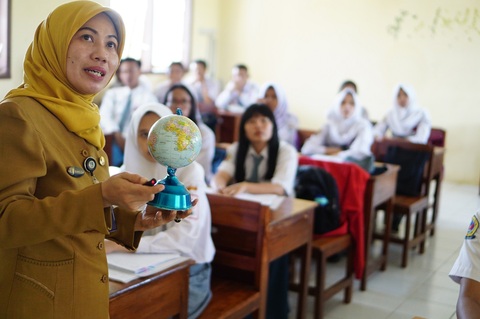
Revitalization of Technology Education in Indonesia Technology Education is the main pillar in preparing Indonesia’s young generation to face the challenges of the 21st century which are increasingly complex and changing rapidly. In the digital era that continues to grow rapidly, the revitalization of technology education is an important step to ensure that students have knowledge, skills and competencies that are relevant to future needs.
The revitalization of technology education in Indonesia must involve profound changes in curriculum, teaching methods, infrastructure, and teacher training and development. It aims to provide students with a holistic and sustainable education, so that they can become innovators, creators and leaders in the world of technology.

First of all
Necessary to conduct a thorough review of the existing technology education curriculum. The curriculum should be adapted to the latest technological developments and integrate aspects such as programming, design, artificial intelligence and robotics. In addition, it is also important to strengthen project-based education which encourages students to learn actively and creatively through practical experiences.
In addition to adjusting the curriculum
teaching methods must also be updated to suit technological developments. The use of digital and multimedia technologies must be an integral part of the learning process. Teachers need to be trained in the utilization of modern technologies such as mobile applications, interactive educational software and online learning platforms. This will provide students with a more engaging and interactive learning experience, and help them develop their adaptability to changing technology.
In addition
investment in technology education infrastructure is critical. Every school must be equipped with adequate facilities, such as computer laboratories, multimedia resource centers, and fast internet networks. In the digital era, broad and high-quality access to information and communication technology is an integral part of the learning process. With adequate infrastructure, students will be able to properly develop technology skills and face real-world challenges.
Furthermore, teacher training and development is also an important component of the revitalization of technology education. Teachers need to be given the opportunity to take part in ongoing training in technology, including increasing their ability to use the latest tools and applications. Support and collaboration between the government, educational institutions and the technology industry must also be increased, so that teachers can keep abreast of the latest developments and acquire relevant resources.
In addition to aspects of curriculum, teaching methods, infrastructure and teacher training, the revitalization of technology education must also encourage industry collaboration and involvement. Partnerships between schools and technology companies will allow students to be directly involved in real projects and gain practical insights into the world of work. Internships, industry visits, and other collaborative activities can increase students’ understanding of real-world applications of technology and help them develop the skills needed by industry.
In addition, it is also important to encourage student interest and participation in technology. Extracurricular programs, competitions and research activities should be supported and expanded. In this way, students will have the opportunity to develop their talents and interests in technology, as well as broaden their horizons about potential careers.
In conclusion, the revitalization of technology education in Indonesia is important to build a young generation that excels in the digital era. Changes in curriculum, teaching methods, infrastructure, teacher training, and industry involvement must be comprehensive. Only with these steps can we ensure that technology education in Indonesia is relevant, competitive, and able to produce graduates who are ready to face future challenges. By preparing a generation capable of innovation, Indonesia will be able to compete in this era of ever-evolving technology and lead to sustainable progress.


